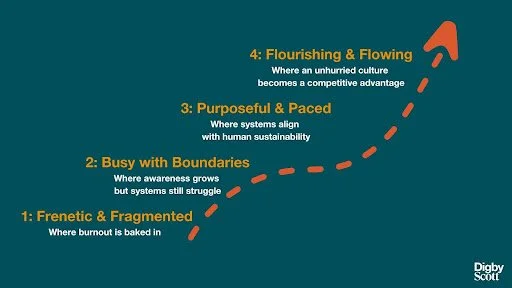How Unhurriedly Productive is Your Culture?
What if your organisation's competitive advantage came not from working faster, but from working with more intention and focus?
I recently asked a group of HR leaders to rate where their organisation's culture sat on the unhurried productivity scale. Where would you place yours?
Level 1: Frenetic & Fragmented
Where activity is mistaken for achievement and burnout is simply part of the job.
Constant firefighting with little strategic time allocation
Success measured by activity (hours worked, emails sent) rather than outcomes
Technology creates constant interruptions rather than enabling focus
High turnover, especially among high performers
Level 2: Busy with Boundaries
Where awareness grows, but systems still struggle.
Some teams experiment with focus time, but inconsistently
Meeting policies being introduced (e.g., no-meeting Fridays)
Productivity metrics beginning to shift beyond activity measures
Pockets of good practice exist but aren't systematised
Level 3: Purposeful & Paced
Where systems align with human sustainability.
Clear distinction between deep work and collaborative work
Outcomes consistently valued over inputs or activities
Slack is intentionally built into schedules (80-90% capacity planning)
Regular reflection practices to eliminate low-value work
Level 4: Flourishing & Flowing
Where an unhurried culture becomes a competitive advantage.
"Flow state" work is the norm rather than the exception
Work allocation based on individual strengths, interests and energy
Regular capacity reviews eliminate unnecessary work
Innovation thrives through dedicated thinking and experimentation time
Where are you at?
Most of those HR leaders raised their hands for ‘Busy with Boundaries’.
Here are some interesting stats:
Microsoft’s Work Trends Survey found that 68% of people don’t have enough time to focus on important tasks. What might that mean for your team's most important work?
Deloitte’s 2025 Human Capital Trends Report highlights that 41% of employee time is spent on work that doesn't contribute to value creation. Imagine what your organisation could achieve with that time back.
Over the past two years, my research on how hurried people feel consistently shows that two-thirds of people feel ‘hurried most of the time’ or ‘always hurried.’ This mirrors what I'm hearing in my conversations with leaders.
With 57% of the New Zealand workforce at a high risk of burnout, it’s easy to draw a line to one of the major factors causing that. Busyness.
Yet it doesn’t have to be this way:
One of Salesforce’s divisions invited employees to be in a two-week experiment encouraging regular breaks. It led to a 21% increase in productivity scores, a 230% increase in ability to manage stress, a 92% increase in focus and a 63% increase in overall satisfaction.
Alex Soojung-Kim Pang’s research (he’s the author of ‘Rest’) shows that companies that reduced working hours by 20% often saw little to no decrease in output, and sometimes even increases.
Organisations that optimise for sustainable human performance outperform those that don’t.
If creating an unhurriedly productive culture matters to you, I'd love to help you make it happen. Starting now.
Where to begin?
I've designed an 'Unhurried Productivity Diagnostic' that helps you and your team build a picture of how unhurriedly productive you are each day. It takes just five minutes at the end of each day for a week. The increased awareness alone often creates significant shifts in how people work.
It's free to use. Download it here.
I'm also looking to work with a handful of forward-thinking leaders and teams who are serious about creating more unhurriedly productive cultures. These partnerships will form the basis of deeper research and proven approaches to this work. If you'd like your organisation to be part of this select group, let's talk.
By the way, if you’d like to know why this matters to me so much, it’s very personal. Check out my story here.

